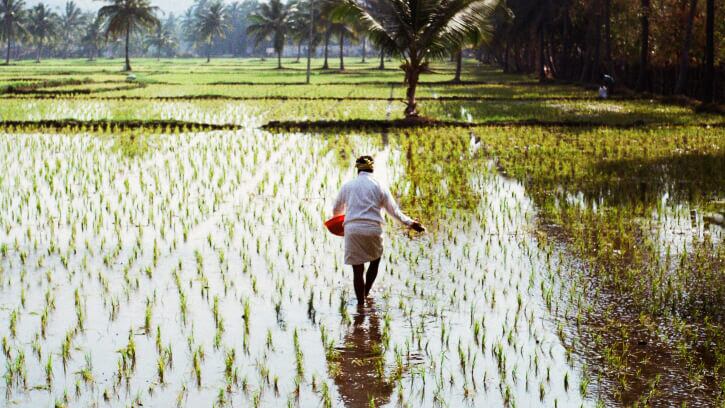As well as supplying cocoa, coffee, dairy and spices, the Singapore-based company (the new operating group born out of Olam) is the number one supplier of all seven major nuts and the world's largest independent hazelnut supplier. Such is its scope, it claims to supply enough hazelnuts to make 673 million jars of hazelnut spread every year.
The company reached over 105,000 people in its cashew and hazelnut supply chains with health and nutrition support last year – one of several milestones published today in its first Nuts Trails impact report, which shares 12 months of progress data towards its 2030 cashew and hazelnut sustainability goals.
While western consumers choose cashews and hazelnuts partly thanks to their nutritional benefits, the farmers and their families that are producing these nuts in countries like Côte d’Ivoire and Turkey do not always have the means to meet their own health and nutrition needs, according to ofi.
In Côte d'Ivoire for example, where malnutrition contributes to the stunted growth and development of 1 in 5 children, ofi’s cashew team partnered with the National Nutrition Program (PNN) to geo-locate and screen over 2,500 children in cashew communities using the newly developed Infant Malnutrition System Alert (IMSA) smartphone-based application. As a result, 49 moderate and acute cases were identified and referred to healthcare facilities, while 10 boreholes were also installed to provide communities with access to safe drinking water.

Farmer livelihoods, human rights and climate action
The report also details progress made by ofi’s cashew and hazelnuts teams in the last year against 2030 targets on farmer livelihoods, human rights and climate action. This includes reaching a 2030 target of training 100% of hazelnut workers in ofi’s sustainability programmes on gender equality, labour, and children’s rights, distributing over US$1million in premiums to help cashew farmers get the best possible value from their crop, and conducting soil analysis for over 700 hazelnut farmers to optimise fertiliser use.
Burcu Turkay, Global Head of Sustainability for Nuts, at ofi said: “The data we’re collecting at every step of the supply chain, from farm to factory, tells us where we’re making a difference and how we can have even greater impact.”
Ofi customers can partner track the performance of their own supply chains via its sustainability management system called AtSource. “It means that when they buy our ingredients, they can be confident these will not only deliver on flavour and functionality, but also add value for farmers and communities,” said Turkay.
For example, the company is busy improving social and labour conditions in the hazelnut supply chain. From ofi’s sourcing and processing operations in Turkey (which accounts for nearly three-quarters of global production) its hazelnuts are exported all over the world.
VIDEO: Burcu Turkay, Global Head of Sustainability for Nuts at ofi, explains how the company’s sustainability interventions at its hazelnut farms in Turkey begin with mapping the farms for information about the where the nuts are coming from.
Turkey relies on a large migrant workforce for the harvest season. In 2018, ofi set a first for the hazelnut and Turkish agricultural sector by introducing labour contracts for seasonal migrant workers. Ofi social workers, meanwhile, map the profiles and movement of these farm workers as they travel the country, allowing it to conduct risk and needs assessments. Via its ‘Women on the Roads’ programme, female workers receive training on issues such labour rights, occupational health and safety, first aid, child labour and grievance mechanisms.
The Child Labour Monitoring & Remediation Systems (CLMRS), designed by the International Cocoa Initiative, has also been rolled out in Turkey. And since 2015, it has partnered with the International Labour Organisation to establish summer schools as safe spaces for the children of migrant workers to play, learn and not work during the hazelnut harvest. Throughout its nuts supply chian, ofi has so far placed 2,840 children in seven schools. It has a 2030 goal to provide science equipment and teacher training for 20 schools, to benefit 8,000 children (find pic).
Ashok Krishen, CEO Nuts at ofi said: “It’s important the nuts we source for our customers are also good for the people and communities that produce them. Together with our customers and partners, our teams on the ground work in and with these communities to improve access to vital health services and nutrition advice, as part of our strategy to find more creative, productive, and sustainable ways of supplying cashew and hazelnut ingredients.”
Ofi’s impact report revealed that in 2022 6,352 farmers received soil analysis to improve fertiliser use, while 714 of farmers were trained in crop residue management and composting practices. The company aims to train 50,000 hazelnut farmers in ‘good agricultural’ practices by 2030. This would equate to a 30% average yield increase for hazelnut farmers compared to 6.98% in 2020.
“It is important to train the farmers on good agricultural practices and climate smart agricultural practices in our sustainability programme,” explained Turkay.
Meanwhile, 100% (or 3,462) of women seasonal migrant workers in its nuts supply chains were trained on health, nutrition and labour rights in 2022. In Turkey over 1,500 female workers received health screenings and advice by ofi social workers to diagnose and prevent conditions such as diabetes and anemia.

Using digital tools to improve traceability
The company is targeting 100% traceability in its direct supply chain by 2030. In 2022 the figure was 47%, up 11% from 2021.
The company is therefore also using digital tools to gather better data and improve traceability. The Olam Farmer Information System (OFIS) is ofi's proprietary, smallholder technology platform to gather, process and analyse information about farmers and the ‘first mile’ of the supply chain. Farmer data captured includes GPS location; date and volume of product procured by ofi. Much of the data from OFIS feeds into sustainability management system AtSource, making it visible to customers and partners to support and report on their sustainability goals.




